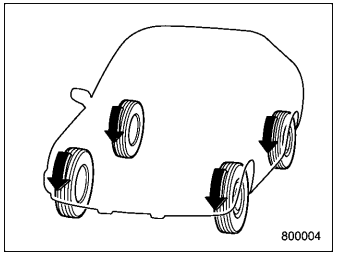Subaru Forester: Driving tips / Driving tips for AWD models
WARNING
- Always maintain a safe driving speed according to the road and weather conditions in order to avoid having an accident on a sharp turn, during sudden braking or under other similar conditions.
- Always use the utmost care in
driving – overconfidence because
you are driving an All-Wheel Drive vehicle could easily
lead to a serious accident.
When replacing or installing tire(s), all four tires must be the same for following items.
- Size
- Speed symbol
- Load index
- Circumference
- Construction
- Manufacturer
- Brand (tread pattern)
- Degrees of wear
For the items (a) to (c), you must obey the specification that is printed on the tire placard. The tire placard is located on the driver’s door pillar.
If all the four tires are not the same for items (a) to (h), serious mechanical damage could be caused to the drivetrain of the car, and affect the followings.
- Ride
- Handling
- Braking
- Speedometer/Odometer calibration
- Clearance between the body and tires
It also may be dangerous and lead to loss of vehicle control, and it can lead to an accident.
CAUTION
If you use a temporary spare tire to replace a flat tire, be sure to use the original temporary spare tire stored in the vehicle. Using other sizes may result in severe mechanical damage to the drivetrain of your vehicle.

All-Wheel Drive distributes the engine power to all four wheels. AWD models provide better traction when driving on slippery, wet or snow-covered roads and when moving out of mud, dirt and sand. By shifting power between the front and rear wheels, SUBARU AWD can also provide added traction during acceleration and added engine braking force during deceleration.
Therefore, your SUBARU AWD vehicle may handle differently than an ordinary two wheel drive vehicle and it contains some features unique to AWD. For safety purposes as well as to avoid damaging the AWD system, you should keep the following tips in mind.
- An AWD model is better able to climb steeper roads under snowy or slippery conditions than a two wheel drive vehicle. There is little difference in handling, however, during extremely sharp turns or sudden braking. Therefore, when driving down a slope or turning corners, be sure to reduce your speed and maintain an ample distance from other vehicles.
- Always check the cold tire pressure before starting to drive. The recommended tire pressure is provided on the tire placard, which is located under the door latch on the driver’s side.
- Frequent driving of an AWD vehicle
under hard-driving conditions such as
steep hills or dusty roads will necessitate
more frequent replacement of the following
items than that specified in the “Warranty
and Maintenance Booklet”.
- Engine oil
- Brake fluid
- Rear differential gear oil
- Continuously variable transmission fluid
- Front differential gear oil
- There are some precautions that you must observe when towing your vehicle. For detailed information, refer to “Towing”.
 On-road and off-road driving
On-road and off-road driving
WARNING
In a rollover crash, an unbelted
person is significantly more
likely to die than a person wearing
a seatbelt. You the driver and
all your passengers should fasten
the seatbelts before starting
to drive in order to minimize the
chance of serious injury or death...
Other information:
Subaru Forester 2019-2026 Owners Manual: Driver’s seat
Seat position forward/backward control switchTo adjust the seat forward or backward, move the control switch forward or backward. During forward/backward adjustment of the seat, the seat cushion angle or height cannot be adjusted. Seat cushion angle control switchTo adjust the seat cushion angle, pull up or push down the front end of the control switch...
Subaru Forester 2019-2026 Owners Manual: Washing the underbody
Chemicals, salts and gravel used for deicing road surfaces are extremely corrosive, accelerating the corrosion of underbody components, such as the exhaust system, fuel and brake lines, brake cables, floor pan and fenders, and suspension. Thoroughly flush the underbody and inside of the fenders with lukewarm or cold water at frequent intervals to reduce the harmful effects of such agents...
Categories
- Manuals Home
- Subaru Forester Owners Manual
- Subaru Forester Service Manual
- Steering Responsive Headlight (SRH)
- Unlock using PIN Code Access
- Shift lock release using the shift lock release button
- New on site
- Most important about car
Windshield wiper and washer switches
The wiper operates only when the ignition switch is in the “ON” or “ACC” position.

